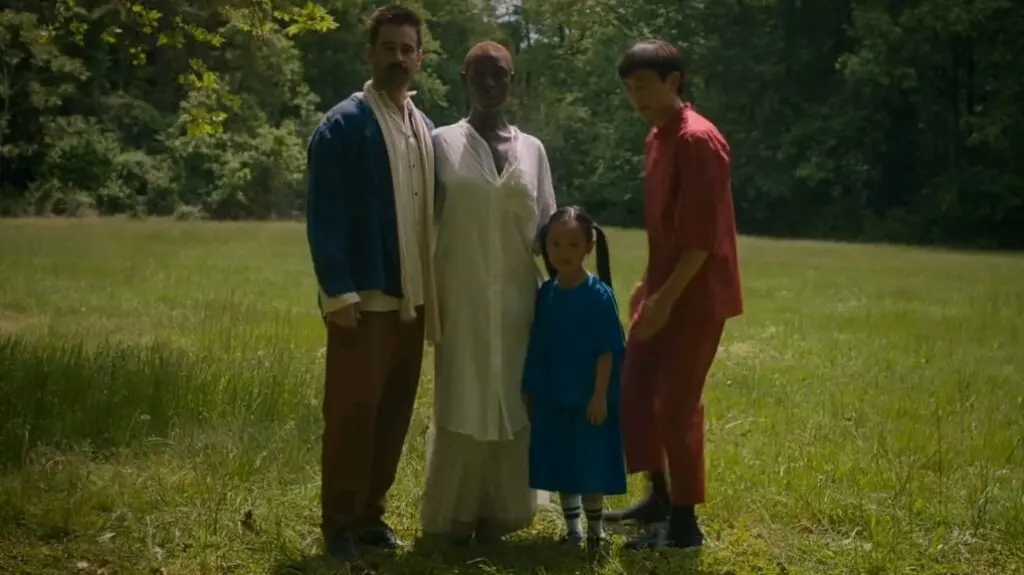Summary
A thoughtful, exquisite view of mindfulness and rumination.
This review of the film After Yang does not contain spoilers.
After Yang is an exquisite film, one that communicates more through a highly contemplative lens with a single shot than a monologue. A breathing-taking dream-like film that’s evocatively beautiful on the eyes. The film premiered at Sundance a few short weeks ago. After Yang handles grief with the most delicate and deft touch, all while, as we cut back to the real world, everything seems to be crumbling around us with every passing minute.
After Yang starts with a family photo in a bright green grass field. A young man named Yang takes his time setting up his beloved camera. The father, Jake (Colin Farrell, who is having a great week), seems to be extraordinarily patient. His wife, Kyra (Queen & Slim‘s Jodie Turner-Smith), stands stoically. Almost statuesque. How to act appropriately and professionally is crucial to her. Then there is Mika (Indonesian child actress Malea Emma Tjandrawidjaja), their adopted Chinese child (who also may be the world’s most adorable little girl). She adores Yang.
But who is Yang? He’s the android they purchased. (The film synopsis states a “beloved companion” that makes him sound like her Golden Retriever). As they compete in an online family dancing competition, he begins to dance; ironically, that looks like the “robot,” but he keeps repeating the same move over and over. Yang is malfunctioning. To Jake and Kyra, repairing him and comparing the cost versus reward is a matter of utility. For Mika, she is losing her best friend and childhood half. The only sibling she has ever known.
Director Koganada (Columbus) co-wrote the script with Alexander Weinstein. This basis is from his own short story, Saying Goodbye to Yang. Labeled as a science fiction drama, Koganada merely uses that as a background, one to communicate life having a greater purpose within a higher existence. This is visually captured perfectly by Benjamin Loeb (Pieces of a Woman).
On the surface, After Yang is about Jake waking from a slumber of importance in life. His neighbor, George (Jockey‘s Clifton Collins, Jr.), has embraced and that Jake found almost trite. As the film progresses, he illegally extracts Yang’s memory chip. He relies on the help of the paranoid Russ (The Dark Knight‘s Ritchie Coster), who threatens him. Also, the empathetic Cleo (Mississippi Masala‘s Sarita Choudhury) supports him. While viewing the data, he becomes more mindful of his surroundings. More importantly, he has less time for rumination. This is explored through data stored of Yang finding meaning with Ada, played by Koganada player Haly Lu Richardson
Koganada also plays with now modern themes of identity. For instance, Mika is Chinese, and Yang enters the picture for this very reason. Her classmates tell Mika that Jake and Kyra are not her birth parents. Many want to bury their heads in the sand about not seeing differences rather than embracing them. Here, they shame and confuse Mika with her cultural values. This is just good stuff considering the past decade how international adoption has been a hot-button topic.
Here, there are companies called Brothers & Sisters that provide this service. Like the real-life Bethany Christian Services, it is a significant player who just dropped an international adoption license. The secondary theme here of issues over cultural migration is authentic. Koganada wants us to question this dilemma. Some have us heading to an ambiguous culture compared to those who want to preserve individuality.
Koganada’s film (along with his upcoming Apple TV+ series Pachinko) is too similar in tone. You can even argue all his characters act unnaturally and rarely show genuine emotion. Several are constantly behaving in a serene state of control that isn’t normal in film or television. That is a valid point and hard to argue. But he stays true to his intent and never deviates from this position. Not every film has to be someone who has little to no control over their emotions. It’s not normal to have that interfere with someone’s daily functioning.
Columbus, Koganada’s first film, brushed away the melodrama that comes with romance. Here, he strips away the family disputes in After Yang. The film is beautifully composed while never relying on tropes to explore deeper themes and meanings. Besides being a poignant look at grief, what we have here is a vivid view of waking up from numbing depression.
After Yang is more mindful than most.
What did you think of the film After Yang? Comment below!




